User:Juanagustinh1999: Difference between revisions
Jump to navigation
Jump to search
No edit summary |
|||
| (19 intermediate revisions by the same user not shown) | |||
| Line 21: | Line 21: | ||
|-- bgcolor="#EEEEEE" | |-- bgcolor="#EEEEEE" | ||
! rowspan="2" style="background:Lightgrey; color:black;" |1 | ! rowspan="2" style="background:Lightgrey; color:black;" |1 | ||
| rowspan=2|[[120px]] | | rowspan=2|[[File:Pres_C_Folch_Mathei.png|120px]] | ||
| rowspan="2" align="center" |'''Celestino Folch Mathei'''<br /><small>(1831 - 1885)</small> | | rowspan="2" align="center" |'''Celestino Folch Mathei'''<br /><small>(1831 - 1885)</small> | ||
|18 July 1878||18 July 1882 | |18 July 1878||18 July 1882 | ||
| Line 30: | Line 30: | ||
|-- bgcolor="#EEEEEE" | |-- bgcolor="#EEEEEE" | ||
! rowspan="3" style="background:Lightgrey; color:black;" |2 | ! rowspan="3" style="background:Lightgrey; color:black;" |2 | ||
| rowspan=5|[[120px]] | | rowspan=5|[[File:Pres_F_Rauch_Estrada.png|120px]] | ||
| rowspan="5" align="center" |<small>Brig. Gen.</small><br />'''Federico Rauch Estrada'''<br /><small>( | | rowspan="5" align="center" |<small>Brig. Gen.</small><br />'''Federico Rauch Estrada'''<br /><small>(1846 - 1927)</small> | ||
| rowspan=2|18 July 1882 | | rowspan=2|18 July 1882 | ||
| rowspan=2|18 July 1886 | | rowspan=2|18 July 1886 | ||
| Line 50: | Line 50: | ||
|-- bgcolor="#EEEEEE" | |-- bgcolor="#EEEEEE" | ||
! rowspan="2" style="background:#0087DC; color:white;" |3 | ! rowspan="2" style="background:#0087DC; color:white;" |3 | ||
| rowspan=2|[[120px]] | | rowspan=2|[[File:Pres_C_de_Anchorena.png|120px]] | ||
| rowspan="2" align="center" |'''Carlos de Anchorena'''<br /><small>(1839 - 1897)</small> | | rowspan="2" align="center" |'''Carlos de Anchorena'''<br /><small>(1839 - 1897)</small> | ||
|18 July 1890||18 July 1894 | |18 July 1890||18 July 1894 | ||
| Line 59: | Line 59: | ||
|-- bgcolor="#EEEEEE" | |-- bgcolor="#EEEEEE" | ||
! rowspan="2" style="background:#0087DC; color:white;" |4 | ! rowspan="2" style="background:#0087DC; color:white;" |4 | ||
| rowspan=2|[[120px]] | | rowspan=2|[[File:Pres_M_A_Suarez_Ibarra.png|120px]] | ||
| rowspan="2" align="center" |'''Miguel Ángel Suárez Ibarra'''<br /><small>( | | rowspan="2" align="center" |'''Miguel Ángel Suárez Ibarra'''<br /><small>(1856 - 1933)</small> | ||
|18 July 1894||4 September 1897 | |18 July 1894||4 September 1897 | ||
|''Partido Conservador'' | |''Partido Conservador'' | ||
| Line 68: | Line 68: | ||
|-- bgcolor="#EEEEEE" | |-- bgcolor="#EEEEEE" | ||
! rowspan="2" style="background:#0087DC; color:white;" |5 | ! rowspan="2" style="background:#0087DC; color:white;" |5 | ||
| rowspan=2|[[120px]] | | rowspan=2|[[File:(1897-1898,_1902-1905)_Presidente_Jorge_Quintana_Rosas.v2.png|120px]] | ||
| rowspan="2" align="center" |'''Jorge Quintana Rosas'''<br /><small>(1843 - 1925)</small> | | rowspan="2" align="center" |'''Jorge Quintana Rosas'''<br /><small>(1843 - 1925)</small> | ||
|4 September 1897||18 July 1898 | |4 September 1897||18 July 1898 | ||
| Line 77: | Line 77: | ||
|-- bgcolor="#EEEEEE" | |-- bgcolor="#EEEEEE" | ||
! rowspan="2" style="background:#0087DC; color:white;" |6 | ! rowspan="2" style="background:#0087DC; color:white;" |6 | ||
| rowspan=2|[[120px]] | | rowspan=2|[[File:Pres_M_Garcia_Bosch.png|120px]] | ||
| rowspan="2" align="center" |'''Manuel García Bosch'''<br /><small>(1861 - 1930)</small> | | rowspan="2" align="center" |'''Manuel García Bosch'''<br /><small>(1861 - 1930)</small> | ||
|18 July 1898||18 July 1902 | |18 July 1898||18 July 1902 | ||
| Line 86: | Line 86: | ||
|-- bgcolor="#EEEEEE" | |-- bgcolor="#EEEEEE" | ||
| rowspan="2" align="center" style="background:#0087DC; color:white;" |(5) | | rowspan="2" align="center" style="background:#0087DC; color:white;" |(5) | ||
| rowspan=2|[[120px]] | | rowspan=2|[[File:(1897-1898,_1902-1905)_Presidente_Jorge_Quintana_Rosas.v2.png|120px]] | ||
| rowspan="2" align="center" |'''Jorge Quintana Rosas'''<br /><small>(1843 - 1925)</small> | | rowspan="2" align="center" |'''Jorge Quintana Rosas'''<br /><small>(1843 - 1925)</small> | ||
|18 July 1902||14 September 1905 | |18 July 1902||14 September 1905 | ||
| Line 95: | Line 95: | ||
|-- bgcolor="#EEEEEE" | |-- bgcolor="#EEEEEE" | ||
! rowspan="2" style="background:#0087DC; color:white;" |7 | ! rowspan="2" style="background:#0087DC; color:white;" |7 | ||
| rowspan=2|[[120px]] | | rowspan=2|[[File:Pres_L_Martinez_Sosa.png|120px]] | ||
| rowspan="2" align="center" |'''Luis Martínez Sosa'''<br /><small>(1851 - 1928)</small> | | rowspan="2" align="center" |'''Luis Martínez Sosa'''<br /><small>(1851 - 1928)</small> | ||
|14 September 1905||6 October 1905 | |14 September 1905||6 October 1905 | ||
| Line 113: | Line 113: | ||
|-- bgcolor="#EEEEEE" | |-- bgcolor="#EEEEEE" | ||
! rowspan="4" style="background:#FFD700; color:black;" |9 | ! rowspan="4" style="background:#FFD700; color:black;" |9 | ||
| rowspan=4|[[120px]] | | rowspan=4|[[File:Pres_C_Costa_Luz.png|120px]] | ||
| rowspan="4" align="center" |'''Cipriano Costa Luz'''<br /><small>(1860 - 1943)</small> | | rowspan="4" align="center" |'''Cipriano Costa Luz'''<br /><small>(1860 - 1943)</small> | ||
|20 December 1905 | |20 December 1905 | ||
| Line 130: | Line 130: | ||
|-- bgcolor="#EEEEEE" | |-- bgcolor="#EEEEEE" | ||
! rowspan="2" style="background:#FFD700; color:black;" |10 | ! rowspan="2" style="background:#FFD700; color:black;" |10 | ||
| rowspan=2|[[120px]] | | rowspan=2|[[File:Pres_D_Gonzalez_Glinski.png|120px]] | ||
| rowspan="2" align="center" |'''David González Glinski'''<br /><small>(1849 - 1929)</small> | | rowspan="2" align="center" |'''David González Glinski'''<br /><small>(1849 - 1929)</small> | ||
|18 July 1910||18 July 1914 | |18 July 1910||18 July 1914 | ||
| Line 167: | Line 167: | ||
! rowspan="2" style="background:#FFD700; color:black;" |14 | ! rowspan="2" style="background:#FFD700; color:black;" |14 | ||
| rowspan=2|[[120px]] | | rowspan=2|[[120px]] | ||
| rowspan="2" align="center" |'''Guillermo Nicasio Adler Ortiz'''<br /><small>( | | rowspan="2" align="center" |'''Guillermo Nicasio Adler Ortiz'''<br /><small>(1874 - 1954)</small> | ||
|18 July 1922||18 July 1926 | |18 July 1922||18 July 1926 | ||
|''Partido | |''Partido Liberal'' | ||
|'''Saturnino Iturregaray Bosch''' | |'''Saturnino Iturregaray Bosch''' | ||
|- | |- | ||
| colspan="4" | <small>Indirect elections. During the presidency of Adler Ortiz, the death penalty was abolished. The Agricultural Bank and the National Mortgage Bank were founded. He created the state company Petroleos del Estado (PETRESA) | | colspan="4" | <small>Indirect elections. During the presidency of Adler Ortiz, the death penalty was abolished. The Agricultural Bank and the National Mortgage Bank were founded. He created the state company Petroleos del Estado (PETRESA).<small/> | ||
|-- bgcolor="#EEEEEE" | |-- bgcolor="#EEEEEE" | ||
! rowspan="3" style="background:Lightgrey; color:black;" | | ! rowspan="2" style="background:#0087DC; color:white;" |15 | ||
| rowspan=2|[[120px]] | |||
| rowspan="2" align="center" |'''Leopoldo Suárez Blanco'''<br /><small>(1867 - 1945)</small> | |||
|18 July 1926||18 July 1930 | |||
|''Unión Demócrata Nacional'' | |||
|'''Arturo López Costa''' | |||
|- | |||
| colspan="4" | <small>Indirect elections. First peaceful transfer of government between two political parties. Journalist, owner of the newspaper El Republicano. Revitalized the old and discredited Conservative Party as the National Democratic Union, and promoted the image of anti-corruption and fiscal transparency. He took office in the midst of a climate of tension due to the murder of the liberal deputy Rafael Aliaga Castillo, which some opposition media attributed to him. One of its achievements was the national census of 1928. The economic situation was prosperous due to the prosperity of international markets.<small/> | |||
|-- bgcolor="#EEEEEE" | |||
! rowspan="2" style="background:#0087DC; color:white;" |16 | |||
| rowspan=2|[[120px]] | |||
| rowspan="2" align="center" |'''Juan Carlos Bellacqua'''<br /><small>(1882 - 1947)</small> | |||
|18 July 1930||18 July 1934 | |||
|''Unión Demócrata Nacional'' | |||
|'''Victorio Castro Ormachea''' | |||
|- | |||
| colspan="4" | <small>Indirect elections. Second president born to immigrant parents. He planned the approval of a Labor Code that was ultimately not carried out due to opposition from both employers and unions. The government's relationship with the unions deteriorated, leading to the General Strike of 1933. Discontent with the government caused Bellacqua's popularity to fall, and the image of a power-hungry populist began to rise: Samael Williams.</small> | |||
|-- bgcolor="#EEEEEE" | |||
! rowspan="5" style="background:Purple; color:white;" |17 | |||
| rowspan=5|[[120px]] | |||
| rowspan="5" align="center" |'''Samael Williams'''<br /><small>(1887 - 1942)</small> | |||
|18 July 1934||18 July 1938 | |||
|''Partido Nacionalista Popular'' | |||
|'''Humberto Báez Nicolich''' | |||
|- | |||
| colspan="4" | <small>Indirect elections. First term. Trade unionist by profession. He won with 56% of the votes against the conservative candidate Victorio Castro Ormachea. He promulgated the Free Health Law (1934). He created the Ministry of Social Welfare, and the National Secretary of Internal Intelligence (SECIIN), which was in charge of monitoring the actions of political opponents. He reformed the Constitution to allow re-election and consolidate the power of his allies, the unions. He appointed three friendly judges to the Supreme Court by decree. He intervened in the National Electoral College, which favored his victory through electoral fraud. | |||
</small> | |||
|-- bgcolor="#EEEEEE" | |||
| rowspan=2|18 July 1938 | |||
| rowspan=2|9 October 1942 | |||
| rowspan=2|''Partido Nacionalista Popular'' | |||
|'''Humberto Báez Nicolich'''<br /><small>''(Resigned 10 March 1939)''</small> | |||
|- | |||
| style="background:Lightgrey; color:black;" |''Vacant'' | |||
|- | |||
| colspan="4" | <small>Indirect elections. Second term. Promoted an Agrarian Reform Law. He faced a motion of no confidence in Congress when he was accused of corruption. Politically cornered, he dissolved Congress, proclaimed a ''state of emergency'', and governed by decree, establishing a ''de facto'' dictatorship. Williams created the Office of National Defense (ODN), his secret police, that was responsible for the prosecution and investigation of political opponents. He dismissed senior members of the armed forces and put sympathizers in charge. He decided not to hold the 1942 elections, which precipitated his downfall. He was overthrown by a coup d'etat in 1942.</small> | |||
|-- bgcolor="#EEEEEE" | |||
! rowspan="2" style="background:#138808; color:white;" |18 | |||
| rowspan=2|[[120px]] | |||
| rowspan="2" align="center" |<small>Lt. Colonel</small><br />'''Álvaro Echeverría Castillo'''<br /><small>(1888 - 1969)</small> | |||
|9 October 1942 | |||
|24 December 1942 | |||
|''Military'' | |||
| style="background:Lightgrey; color:black;" |''Vacant'' | |||
|- | |||
| colspan="4" | <small>He takes office after a coup d'état supported by conservative and liberal sectors. First president of the ''Military Transition.'' Leader of the military junta that overthrew President Williams. He applied various methods of censorship and suppressed labor, union and communist groups. During his short term, the trial of Samael Williams was officiated, which resulted in him being sentenced to 35 years in prison and perpetual disqualification from holding public office. On December 13, 1942, an angry mob overturned the van that was transporting him to prison. Williams was dragged out and lynched in the Plaza de la Constitución, in San Borja, in front of the cathedral where his massacred body was hung. The police tried to control the chaos, leaving about 40 dead and more than 500 injured. Echeverría was removed from office and a new president of the Junta was elected.</small> | |||
|-- bgcolor="#EEEEEE" | |||
! rowspan="2" style="background:#138808; color:white;" |19 | |||
| rowspan=2|[[120px]] | |||
| rowspan="2" align="center" |<small>Lt. General</small><br />'''Plutarco Robles Cuevas'''<br /><small>(1885 - 1972)</small> | |||
|24 December 1942 | |||
|18 July 1945 | |||
|''Military'' | |||
| style="background:Lightgrey; color:black;" |''Vacant'' | |||
|- | |||
| colspan="4" | <small>He replaced Álvaro Echeverría Castillo, being appointed by the Military Junta. Second president of the ''Military Transition''. He spearheaded a major reckoning with the state after the profligacy of the Williams government. He also confiscated the Williams family estates. He dissolved different repressive state organizations created during the Williams dictatorship, such as the ODN (Office of National Defense), and the SECIIN (Secretariat of National Internal Intelligence). He called elections in 1945.</small> | |||
|-- bgcolor="#EEEEEE" | |||
! rowspan="2" style="background:#0087DC; color:white;" |20 | |||
| rowspan=2|[[120px]] | |||
| rowspan="2" align="center" |'''Victorio Castro Ormachea'''<br /><small>(1892 - 1968)</small> | |||
|18 July 1945 | |||
|18 July 1949 | |||
|''Unión Demócrata Nacional'' | |||
|'''Juan A. Álvarez del Castillo''' | |||
|- | |||
| colspan="4" | <small>Indirect elections. First term. He won the elections with 54%, after spending 5 years in exile during the Williams dictatorship. He continued with the policies of de-williamsization. During his government, the Universal Women's Suffrage Law was enacted. Industrialization was promoted, the mining industry was nationalized, through the creation of CEMAN (State Mining Company of Anchuria). Beginning of the period known as the "Prosperous Alternation".</small> | |||
|-- bgcolor="#EEEEEE" | |||
! rowspan="2" style="background:#FFD700; color:black;" |21 | |||
| rowspan=2|[[120px]] | |||
| rowspan="2" align="center" |'''Guillermo Gutiérrez Braun'''<br /><small>(1891 - 1975)</small> | |||
|18 July 1949 | |||
|18 July 1953 | |||
|''Partido Liberal''<br /><small>''Unidos por Anchuria''</small> | |||
|'''Andrés Aguilar Pérez''' | |||
|- | |||
| colspan="4" | <small>Indirect elections. He won the election with 43%, narrowly defeating the U.D.N. candidate. In the last year of his mandate, he faced an economic crisis, due to external factors in the trade balance, which slowed down the growth curve and produced a slight inflationary jump that generated the Panic of 1952, producing the bankruptcy of several banks as a result of the bank run. This allowed the U.D.N. win the next elections.</small> | |||
|-- bgcolor="#EEEEEE" | |||
| rowspan="2" align="center" style="background:#0087DC; color:white;" |(20) | |||
| rowspan=2|[[120px]] | |||
| rowspan="2" align="center" |'''Victorio Castro Ormachea'''<br /><small>(1892 - 1968)</small> | |||
|18 July 1953 | |||
|18 July 1957 | |||
|''Unión Demócrata Nacional'' | |||
|'''Carlos Sánchez de la Cruz''' | |||
|- | |||
| colspan="4" | <small>Indirect elections. Second term. First Television broadcast in Anchuria. He continued economic stability policies with little success. Rise of maximalist ideas. Creation of several guerrillas that fought against the conservative government, such as the FPL and the ERNA. Beginning of the Anchurian Internal Armed Conflict (1957-1952).</small> | |||
|-- bgcolor="#EEEEEE" | |||
! rowspan="2" style="background:#FFD700; color:black;" |22 | |||
| rowspan=2|[[120px]] | |||
| rowspan="2" align="center" |'''Edmundo Ureño Larrigoitia'''<br /><small>(1895 - 1991)</small> | |||
|18 July 1957 | |||
|4 April 1960 | |||
|''Partido Liberal''<br /><small>''Frente de Unidad Nacional''</small> | |||
|'''Julio García Ferrer''' | |||
|- | |||
| colspan="4" | <small>Indirect elections. Faced with the internal conflict with the maximalist guerrillas, he prohibited unions from adopting political or ideological positions and the police under his command repressed union demonstrations, murdering several militants. Operation Winter Sun began in 1958, an offensive against the guerrillas that left dozens dead, but intensified the guerrillas' campaign of terror. It also reduced foreign debt and continued industrialization. After poor results in the fight against the guerrillas, and his centrist positions (which many considered lukewarm), he was overthrown in a coup d'état by Lt. Col. González Bermúdez. After two years and eight months of government.</small> | |||
|-- bgcolor="#EEEEEE" | |||
! rowspan="2" style="background:#138808; color:white;" |23 | |||
| rowspan=2|[[120px]] | |||
| rowspan="2" align="center" |<small>Lt. Colonel</small><br />'''Raimundo González Bermúdez'''<br /><small>(1902 - 1986)</small> | |||
|4 April 1960 | |||
|18 July 1963 | |||
|''Military'' | |||
| style="background:Lightgrey; color:black;" |''Vacant'' | |||
|- | |||
| colspan="4" | <small>González Bermúdez took office after the coup d'état of 1960. He drafted the Statute of the Anchurian Revolution with supraconstitutional status, abolished political parties and prohibited social demonstrations. The national public universities intervened, resisted by students and teachers. Beginning of the May Pacification Operation, which intensified the attack against the guerrillas, who were extremely weakened. He signed the Almenares Pact, which guaranteed the victory of the National Action Front, composed of members of the armed forces and the U.D.N. He called elections in 1963. Start of the ''Infamous Decade''</small> | |||
|-- bgcolor="#EEEEEE" | |||
! rowspan="2" style="background:#FF7F00; color:white;" |24 | |||
| rowspan=2|[[120px]] | |||
| rowspan="2" align="center" |'''Juan Manuel Strauss'''<br /><small>(1898 - 1968)</small> | |||
|18 July 1963 | |||
|18 July 1967 | |||
|''Acción Nacional'' | |||
|'''Agustín Russo Sánchez''' | |||
|- | |||
| colspan="4" | <small>Indirect and fraudulent elections. He proclaimed an amnesty to the members of the military junta led by González Bermúdez. During his mandate, the 1964 Olympic Games were held in Anchuria. Nationalized the electrical industry by creating the CEAEA (Anchurian Energy and Electricity Corporation), and also created TELCEN (National State Telecommunications Company), the state radio and television company. Strauss maintained the fraudulent regime.</small> | |||
|-- bgcolor="#EEEEEE" | |||
! rowspan="2" style="background:#FF7F00; color:white;" |25 | |||
| rowspan=2|[[120px]] | |||
| rowspan="2" align="center" |'''José Ramón Castro Orsini'''<br /><small>(1902 - 1988)</small> | |||
|18 July 1967 | |||
|18 July 1971 | |||
|''Acción Nacional'' | |||
|'''Francisco Martínez Franco''' | |||
|- | |||
| colspan="4" | <small>Indirect and fraudulent elections. Established sales tax. There was a boom in public works, with the construction of the Presidente Strauss Dam and the Ing. Dolina International Bridge, which connects Anchuria with Aururia. There was an increase in mobilizations in favor of free and democratic elections. The 1971 elections were carried out violently, resulting in deaths and injuries. Father of President José Castro Labraña.</small> | |||
|-- bgcolor="#EEEEEE" | |||
! rowspan="2" style="background:#FF7F00; color:white;" |26 | |||
| rowspan=2|[[120px]] | |||
| rowspan="2" align="center" |'''José Raúl Castro Labraña'''<br /><small>(1929 - 2004)</small> | |||
|18 July 1971 | |||
|18 July 1975 | |||
|''Acción Nacional'' | |||
|'''Adolfo López Buchanan''' | |||
|- | |||
| colspan="4" | <small>Indirect and fraudulent elections. Son of President José Castro Orsini. He created the National Museum of History and the National Public Library, in San Borja. Inflation also decreased and reached growth rates of 5% annually. During his presidency, widespread insurrectional activity arose, in the form of "puebladas", such as the so-called ''Villegazo'', demonstrating against corruption, the lack of transparency and the holding of democratic elections. Pressured by popular opinion, and with his popularity at historic lows, he promulgated ''Decree-Law 18,154/75'', which made electoral fraud illegal and organized free and democratic elections.</small> | |||
|-- bgcolor="#EEEEEE" | |||
! rowspan="2" style="background:#B31B1B; color:white;" |27 | |||
| rowspan=2|[[120px]] | |||
| rowspan="2" align="center" |'''Evaristo Echauri Vargas'''<br /><small>(1915 - 1977)</small> | |||
|18 July 1975 | |||
|13 October 1977 | |||
|''Partido Social Anchuriano''<br /><small>''Frente Popular''</small> | |||
|'''Saúl Zielinski Rosales''' | |||
|- | |||
| colspan="4" | <small>Indirect and democratic elections. He won the elections with 68% of the votes, leading a group of center-left and left-wing parties. He carried out an Agrarian Reform in 1976. He nationalized the oil industry and other important areas in the economy. His socialist policies caused a boycott of the large economic markets, which withdrew their investment in the country. The economy sank into a serious recession, which the government tried to alleviate by printing banknotes and appealing to the popular will. Echauri was overthrown in a coup d'état financed by foreign powers. President Echauri was kidnapped, tortured and murdered by the dictatorship that overthrew him.</small> | |||
|-- bgcolor="#EEEEEE" | |||
! rowspan="2" style="background:#138808; color:white;" |28 | |||
| rowspan=2|[[120px]] | |||
| rowspan="2" align="center" |<small>Lt. General</small><br />'''Martín Andrés Arocena'''<br /><small>(1935 - 2006)</small> | |||
|13 October 1977 | |||
|20 March 1981 | |||
|''Military'' | |||
| style="background:Lightgrey; color:black;" |''Vacant'' | |||
|- | |||
| colspan="4" | <small>Arocena came to power after a coup d'état in 1977, sponsored by the Pandosian dictator Victor Emanuel Antonescu. He declared a state of siege and suspended the actions of political parties. He implemented a systematic policy of using state terrorism, which left thousands of people missing, tortured and exiled, including the previous president, Evaristo Echauri, who was detained, tortured and disappeared. He appointed businessman Rómulo Castillo Hidalgo as Minister of Economy, who implemented a neoliberal plan, increasing inflation (rates of more than 100% annually), speculation and the so-called "financial cycle", and a regime of peripheral privatizations that gave rise to a series of private business groups that promoted corruption. Arocena lost the support of the military junta. He was deposed from his position on March 20, 1981, and was replaced by General Juan Carlos Ibarguren. His regime left 62,500 people murdered or missing. Sentenced to life imprisonment for crimes against humanity in 1989.</small> | |||
|-- bgcolor="#EEEEEE" | |||
! rowspan="2" style="background:#138808; color:white;" |29 | |||
| rowspan=2|[[120px]] | |||
| rowspan="2" align="center" |<small>General</small><br />'''Juan Carlos Ibarguren'''<br /><small>(1922 - 1993)</small> | |||
|20 March 1981 | |||
|1 September 1985 | |||
|''Military'' | |||
| style="background:Lightgrey; color:black;" |''Vacant'' | |||
|- | |||
| colspan="4" | <small>Appointed president by the military junta. He continued with the state terrorist and debt policy of his predecessor. It harshly repressed the student protest in Plaza Villegas on October 16, 1984. The massacre left more than 110 dead and 600 arrested. Which generated great criticism internationally. Ibarguren resigned from his position as president due to his great unpopularity, his poor health and his conflict with the army commanders, who already saw that they could not remain in power much longer. He delegated his position to Brig. Gral. Demicheli, who would be in charge of calling elections. In 1986 he fled the country and went into exile in Vestellaria. He never paid for his crimes.</small> | |||
|-- bgcolor="#EEEEEE" | |||
! rowspan="2" style="background:#138808; color:white;" |30 | |||
| rowspan=2|[[120px]] | |||
| rowspan="2" align="center" |<small>Brig. General</small><br />'''Francisco Morales Demicheli'''<br /><small>(1915 - 1986)</small> | |||
|1 September 1985 | |||
|20 January 1986 | |||
|''Military'' | |||
| style="background:Lightgrey; color:black;" |''Vacant'' | |||
|- | |||
| colspan="4" | <small>Appointed president by the military junta. Last military dictator of Anchuria. In charge of calling national elections for November 1985. Shortly before handing over power, he issued a self-amnesty law, forgiving crimes against humanity committed by the dictatorship and ordered the destruction of documentation related to them. He was sentenced to 17 years in prison for crimes against humanity.</small> | |||
|-- bgcolor="#EEEEEE" | |||
! rowspan="2" style="background:#0087DC; color:white;" |31 | |||
| rowspan=2|[[File:Pres J M Dukaroff Duarte.png|120px]] | |||
| rowspan="2" align="center" |'''José Miguel Dukaroff Duarte'''<br /><small>(1918 - 2003)</small> | |||
|20 January 1986 | |||
|20 January 1991 | |||
|''Unión Demócrata Nacional'' | |||
|'''Carlos Tomiković Castro''' | |||
|- | |||
| colspan="4" | <small>Indirect and democratic elections. Dukaroff carried out a strong adjustment policy and cleaned up the Anchurian economy. Created a new currency with the help of the Minister of Economy, Gustavo Rodríguez Guerra, the Anchurian Peso, leaving aside the previous National Currency Peso, and removing 5 zeros from the currency. He officiated the trials of the military junta. Also promulgated ''Law 26,780/89'' which establishes that crimes against humanity cannot prescribe. Through an amendment to the Anchurian Constitution, it was established that the mandate would last 5 years, and the start date of the mandate would be set as January 20.</small> | |||
|-- bgcolor="#EEEEEE" | |||
! rowspan="2" style="background:#0087DC; color:white;" |31 | |||
| rowspan=2|[[File:Pres_J_E_Acevedo.png|120px]] | |||
| rowspan="2" align="center" |'''José Edgardo Acevedo'''<br /><small>(born 1940)</small> | |||
|20 January 1991 | |||
|20 January 1996 | |||
|''Unión Demócrata Nacional'' | |||
|'''Eduardo Muñoz Lagos''' | |||
|- | |||
| colspan="4" | <small>Direct and democratic elections. Former television presenter who became involved in politics. Known for his extravagant hairstyle. He served as National Deputy during the Dukaroff Presidency. He continued the economic policies of his predecessor. During his presidency there was a boom in foreign investment, leading to a better period of prosperity. Sign the Southern Free Trade Agreement, together with the governments of Managuay and Pandosia. He tried to get the Vestellarian government to deport the former dictator Ibarguren, without success, Ibarguren would die shortly after in exile.</small> | |||
|-- bgcolor="#EEEEEE" | |||
! rowspan="2" style="background:#0087DC; color:white;" |32 | |||
| rowspan=2|[[File:(1996-2001)_President_Azucena_Arteaga_Lacroze.v1_(1).png|120px]] | |||
| rowspan="2" align="center" |'''Azucena Arteaga'''<br /><small>(1941 - 2016)</small> | |||
|20 January 1996 | |||
|20 January 2001 | |||
|''Unión Demócrata Nacional'' | |||
|'''José María Ballestrini Ojeda''' | |||
|- | |||
| colspan="4" | <small>Direct and democratic elections. First female president of Anchuria. Her presidency was marked by the Economic Crisis of 1999. He adopted a policy of debt and budget restriction. Which had a strong impact on the world economy and resulted in an increase in unemployment and poverty.</small> | |||
|-- bgcolor="#EEEEEE" | |||
! rowspan="2" style="background:#C90016; color:white;" |33 | |||
| rowspan=2|[[File:Pres_V_Castillo_Arenas.png|120px]] | |||
| rowspan="2" align="center" |'''Vicente Castillo Arenas'''<br /><small>(1948 - 2004)</small> | |||
|20 January 2001 | |||
|15 August 2004 | |||
|''Frente Popular''<br /><small>''Cambia Anchuria''<small> | |||
|'''Alejandro Ballesteros''' | |||
|- | |||
| colspan="4" | <small>Direct and democratic elections. He ran for election in alliance with the centrist Republican Alternative party. One of his first measures was to devalue the currency. To combat poverty and unemployment, it created more than two hundred thousand social plans called the "National Unemployment Plan." The territorial claims of the Aururian dictator Ioannis Metaxas also increased, ignoring the arbitration award of 1916 and claiming 1/3 of the Anchurian territory. Anchuria presented his case to the International Court of Justice (ICJ). On August 15, 2004, while on his way to the ICJ headquarters in Colburg to resolve disputes, Vicente Castillo Arenas died in a plane accident flying over international waters. Today many doubt whether it was an accident or an attack perpetrated by aururian agents.<small> | |||
|-- bgcolor="#EEEEEE" | |||
! rowspan="2" style="background:#E9D66B; color:black;" |34 | |||
| rowspan=2|[[File:Pres_A_Ballesteros.png|120px]] | |||
| rowspan="2" align="center" |'''Alejandro Ballesteros'''<br /><small>(born 1951)</small> | |||
|15 August 2004 | |||
|20 January 2006 | |||
|''Alternativa Republicana''<br /><small>''Cambia Anchuria''<small> | |||
| style="background:Lightgrey; color:black;" |''Vacant'' | |||
|- | |||
| colspan="4" | <small>Vice president of Vicente Castillo Arenas, he assumed the presidency after his death. Finished the presidential term of Castillo Arenas. During his tenure, the International Court of Justice (ICJ) ruled in favor of Anchuria, dismissing Aururian territorial claims. However, the Aururian provocations continue. Ballesteros signed a treaty of international cooperation and protection with Pandosia and the Kingdom of Orel Bactra. He also signed a contract for the purchase of weapons and fighter aircraft with the Kingdom of Ellaria.</small> | |||
|-- bgcolor="#EEEEEE" | |||
! rowspan="2" style="background:#0087DC; color:white;" |35 | |||
| rowspan=2|[[File:Pres_E_Ibanez_Alameda.png|120px]] | |||
| rowspan="2" align="center" |'''Emanuel Ibáñez Alameda'''<br /><small>(1943 - 2017)</small> | |||
|20 January 2006 | |||
|20 January 2011 | |||
|''Unión Demócrata Nacional'' | |||
|'''Daniel Castillo Hernández''' | |||
|- | |||
| colspan="4" | <small>Direct and democratic elections. During his tenure, the Anchurian War (2007-2009) and the Pandosian-Aururian War (2008-2009) were fought. Both ended with the victory of the allied countries: Pandosia, Anchuria, Managuay and Orel-Bactra. Ibáñez was present for the signing of the Treaty of San Borja, which put a cessation to hostilities, and the Treaty of Kingsbury, which established war reparations and sanctions towards Aururia. The war would have about 1,500,000 deaths between both sides, and countless material losses. It would also cause the outbreak of the Aururian Civil War, which continues to this day. He also presided over reconstruction efforts. Ibáñez maintained good relations with General Santino, provisional president of Pandosia after the execution of President Hernández during the Battle of Pablópolis. Signed the Santiago Protocol, which established the creation of the Mutual Defense Organization (ODM), a defensive pact between several countries.</small> | |||
|-- bgcolor="#EEEEEE" | |||
! rowspan="2" style="background:Lightblue; color:black;" |36 | |||
| rowspan=2|[[File:Pres_L_A_Kravetz_Miceli.png|120px]] | |||
| rowspan="2" align="center" |'''Luis Andrés Kravetz Miceli'''<br /><small>(born 1962)</small> | |||
|20 January 2011 | |||
|20 January 2016 | |||
|''Compromiso Ciudadano'' | |||
|'''Rafael Gutiérrez Arcelli''' | |||
|- | |||
| colspan="4" | <small>Direct and democratic elections. The economic crisis resulting from previous economic mismanagement and the Anchurian War was overcome thanks to countercyclical policies, increasing public spending. This generated increases in inflation in subsequent years. He took a large loan from the International Development Fund to cover post-war reconstruction costs. He increased social plans and state benefits, and also stimulated the growth of state employment. President Kravetz took advantage of his role in the state to defend social causes, increasing taxes on large fortunes and companies. During his years as president, growth slowed, provoking the first steps toward the crisis that would erupt during the presidency of his successor.</small> | |||
|-- bgcolor="#EEEEEE" | |||
! rowspan="2" style="background:Lightblue; color:black;" |37 | |||
| rowspan=2|[[File:Pres_R_Gutierrez_Arcelli.png|120px]] | |||
| rowspan="2" align="center" |'''Rafael Gutiérrez Arcelli'''<br /><small>(born 1958)</small> | |||
|20 January 2016 | |||
|20 January 2021 | |||
|''Compromiso Ciudadano'' | |||
|'''Mónica Dávalos Gonzáles''' | |||
|- | |||
| colspan="4" | <small>Direct and democratic elections. He continued the policies of his predecessor. He increased benefits for those who fell into poverty after the war. Spending on infrastructure projects of dubious quality also increased. A major corruption scandal broke out due to overpricing of public works, which led to the resignation of the Minister of Infrastructure, Rafael Orellana. The fiscal crisis of 2019 also broke out, with a large jump in inflation, which reached 7% per month, due to both Kravetz and Gutiérrez printing large amounts of money to finance their expenses. Leading to the resignation of the Minister of Economy Pablo Andrés Arjún.</small> | |||
|-- bgcolor="#EEEEEE" | |||
! rowspan="2" style="background:#0087DC; color:white;" |38 | |||
| rowspan=2|[[File:Pres_M_Vinkovic.png|120px]] | |||
| rowspan="2" align="center" |'''Marianela Vinković'''<br /><small>(born 1976)</small> | |||
|20 January 2021 | |||
|Incumbent | |||
|''Unión Demócrata Nacional''<br /><small>''Unidos por el Cambio''</small> | |||
|'''Juan Carlos Sfogliatelli''' | |||
|- | |||
| colspan="4" | <small>Direct and democratic elections. Second female president of Anchuria. Elected at 45 years old. Previously she served as National Senator and Minister of Foreign Affairs (2011-2016) of the Ibáñez government. His government gradually reduced state spending, also raised taxes and devalued the peso, putting more pressure on vulnerable sectors. He managed to lower inflation from 7% to 6% monthly, which many consider a failure. They also had several corruption scandals over expensive tenders when they said they would be an austere government.</small> | |||
|} | |} | ||
==KINGS== | |||
{{Infobox royalty | |||
| name = Malcolm III "Canmore" | |||
| title = | |||
| titletext = | |||
| more = | |||
| image = King_Malcolm_III_of_Scotland_CK3.png | |||
| image_size = 235px | |||
| alt = | |||
| caption = | |||
| succession = King of Scotland | |||
| moretext = | |||
| reign = Jan 1 1031 - Jul 13 1099 | |||
| reign-type = Reign | |||
| coronation = | |||
| cor-type = Coronation | |||
| predecessor = [[Lulach I of Scotland]] | |||
| pre-type = Predecessor | |||
| successor = [[Kenneth VII of Scotland]] | |||
| suc-type = Successor | |||
| spouse = [[Ingebjørg Finnsdatter]] | |||
| spouse-type = Spouse | |||
| consort = | |||
| issue = {{Plainlist| | |||
*[[Prince Duncan]] | |||
** [[Prince Donald]] | |||
** [[Prince Malcolm]] | |||
** [[Prince Gregor]] | |||
** [[Prince Malcolm II]]}} | |||
| issue-link = | |||
| issue-pipe = | |||
| full name = Malcolm Dunkeld | |||
| era name = | |||
| era dates = | |||
| posthumous name = | |||
| temple name = | |||
| house = Dunkeld | |||
| house-type = Dynasty | |||
| father = [[Duncan I of Scotland]] | |||
| mother = | |||
| birth_date = January 2 1031 | |||
| birth_place = Scone, [[Scotland]] | |||
| death_date = July 13 1099 | |||
| death_place = Glenmore, [[Scotland]] | |||
| burial_date = | |||
| burial_place = | |||
| occupation = | |||
| signature = | |||
| religion = {{wp|Roman Catholicism}} | |||
}} | |||
{{Infobox royalty | |||
| name = Kenneth VII "the Gracious" | |||
| title = | |||
| titletext = | |||
| more = | |||
| image = King_Kenneth_VII_of_Scotland_CK3.png | |||
| image_size = 235px | |||
| alt = | |||
| caption = | |||
| succession = King of Scotland | |||
| moretext = | |||
| reign = Jul 13 1099 - Mar 7 1152 | |||
| reign-type = Reign | |||
| coronation = | |||
| cor-type = Coronation | |||
| predecessor = [[Malcolm III of Scotland]] | |||
| pre-type = Predecessor | |||
| successor = [[Alexander I of Scotland]] | |||
| suc-type = Successor | |||
| succession1 = King of Wales | |||
| moretext1 = | |||
| reign1 = Dec 6 1134 - Mar 7 1152 | |||
| reign-type1 = Reign | |||
| coronation1 = | |||
| cor-type1 = Coronation | |||
| predecessor1 = Title established | |||
| pre-type1 = Predecessor | |||
| successor1 = [[Kenneth II of Wales]] | |||
| suc-type1 = Successor | |||
| spouse = [[Alienora of England]] | |||
| spouse-type = Spouse | |||
| consort = | |||
| issue = {{Plainlist| | |||
*[[Prince Arran]] | |||
** [[Prince Duncan]] | |||
** [[King Alexander I of Scotland]] | |||
** [[Prince Alastair]] | |||
** [[King Kenneth I of Syria]] | |||
** [[Princess Christina]] | |||
** [[Princess Eleanor]] | |||
** [[Princess Galiena]] | |||
}} | |||
| issue-link = | |||
| issue-pipe = | |||
| full name = Kenneth Dunkeld | |||
| era name = | |||
| era dates = | |||
| posthumous name = | |||
| temple name = | |||
| house = Dunkeld | |||
| house-type = Dynasty | |||
| father = [[Prince Donald of Scotland]] | |||
| mother = | |||
| birth_date = Nov 22 1081 | |||
| birth_place = Scone, [[Scotland]] | |||
| death_date = Mar 7 1152 | |||
| death_place = Glenmore, [[Scotland]] | |||
| burial_date = | |||
| burial_place = | |||
| occupation = | |||
| signature = | |||
| religion = {{wp|Roman Catholicism}} | |||
}} | |||
Latest revision as of 19:08, 28 October 2024
List of Presidents of Anchuria
Independent Partido Conservador/UDN Partido Liberal Partido Nacionalista Popular Militar Acción Nacional Partido Social Anchuriano Frente Popular Alternativa Republicana Compromiso Ciudadano
| № | Portrait | Name (Birth–Death) |
Term of Office | Political Party | Vice President | |
|---|---|---|---|---|---|---|
| 1 | 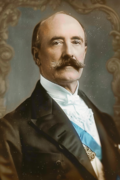
|
Celestino Folch Mathei (1831 - 1885) |
18 July 1878 | 18 July 1882 | Independent | Emilio Rojas Castillo |
| First president of independent Anchuria. Folch Mathei was unanimously elected president in 1878 by the Transitional Council. Was one of the impulsors for the sanction of the Anchurian Constitution of 1879, for this he is considered the Father of the Constitution. Refused to participate in the 1882 Anchurian elections, endorsing independent candidate Federico Rauch. For this, he was selected as his running mate, and elected as vice president. Folch Mathei didn't finish his term, as he died unexpectedly from cholera in may 1885. | ||||||
| 2 | 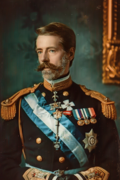
|
Brig. Gen. Federico Rauch Estrada (1846 - 1927) |
18 July 1882 | 18 July 1886 | Independent | Celestino Folch Mathei (Died 16 May 1885) |
| Vacant | ||||||
| Indirect elections. First president son of immigrants, as his father was an orelian military officer involved in the Anchurian War of Independence. Military officer, he bears the rank of Brigadier General. In his first term in office, Rauch modernized the anchurian army, created the San Borja Military Academy. Also, he oversaw the creation of the first railway in Anchuria, financed with public and foreign capital with the objective of facilitate the exportation of agricultural and livestock products from the central plains of Anchuria. Through an ammendment to the anchurian constitution, Rauch established limits for presidential reelection, so that a president can only be reelected once consecutively. | ||||||
| (2) | 18 July 1886 | 18 July 1890 | Partido Conservador | Carlos de Anchorena | ||
| Indirect Elections. Second term. First president to be reelected. Created the Conservative Party for his reelection campaign. His second term is largely considered the starting point of the "Conservative Hegemony" era in anchurian politics. Was succeded by his vice president Carlos de Anchorena. He continued to be one of the head figures of the Conservative Party, long after his tenure. | ||||||
| 3 | 
|
Carlos de Anchorena (1839 - 1897) |
18 July 1890 | 18 July 1894 | Partido Conservador | Manuel Aguirre Ferrer |
| Indirect elections. He continued Rauch's policies. During his mandate, Law 3520 of mandatory primary education was enacted. He also promoted the creation of public schools throughout the country. In addition, the first telegraph cables were created. One of the negative points is the beginning of the use of electoral fraud, since the Anchurian electoral system was a contested vote, which favored this practice. Due to his delicate state of health, he decided not to run for a second term. He died shortly after, in 1897, at the age of 58, as a result of the tuberculosis that consumed him. | ||||||
| 4 | 
|
Miguel Ángel Suárez Ibarra (1856 - 1933) |
18 July 1894 | 4 September 1897 | Partido Conservador | Jorge Quintana Rosas |
| Indirect elections. He enacted laws that favored international trade, although favoring friendly interests. External debt increased, and the banking situation worsened. During his mandate, the Liberal Rebellion of 1897 occurred, which, although it failed in its objectives and was repressed by the army, led to Suárez's fall from grace as he lost the political support of his party. He resigned on July 8, 1897, and was succeeded by his vice president. | ||||||
| 5 | 
|
Jorge Quintana Rosas (1843 - 1925) |
4 September 1897 | 18 July 1898 | Partido Conservador | Vacant |
| Vice president of Miguel Suárez Ibarra, assumed the presidency after his resignation. First term. He carried out a major economic reform to try to eradicate corruption and put the accounts in order. He did not stand in the election as the Conservative Party had another candidate chosen. | ||||||
| 6 | 
|
Manuel García Bosch (1861 - 1930) |
18 July 1898 | 18 July 1902 | Partido Conservador | Juan Pérez Fuster |
| Indirect elections. He managed to solve the economic crisis, cleaning up finances and creating the Bank of Anchuria. He founded the Museum of Fine Arts, encouraged immigration and initiated a debt relief policy. Also, Bosch created the Ministry of Public Works, that lead to the construction of the first highway in the country, among other works. | ||||||
| (5) | 
|
Jorge Quintana Rosas (1843 - 1925) |
18 July 1902 | 14 September 1905 | Partido Conservador | Luis Martínez Sosa |
| Indirect elections. Second term. He was the candidate of the Conservative Party, so he had political support, he followed the socioeconomic reforms of his predecessors. In 1905 he had to face the last liberal armed uprising, which triggered the outbreak of the Hundred Days War, which confronted the liberals, who sought reform of the constitution to limit the powers of the executive and improve the salary conditions of the class. worker, and the central government. He resigned from the presidency in the face of the imminent victory of the liberals. | ||||||
| 7 | 
|
Luis Martínez Sosa (1851 - 1928) |
14 September 1905 | 6 October 1905 | Partido Conservador | Vacant |
| Vice president of Luis Martínez Sosa, assumed the presidency after his resignation. Liberal victory in the Battle of Sanclemente. He resigned a few days later under pressure from Congress. | ||||||
| 8 | 120px | Manuel Alcorta (1849 - 1929) |
6 October 1905 | 20 December 1905 | Independent | Vacant |
| Provisional President appointed by Congress. He governed for 75 days until the arrival of the liberal leader Cipriano Costa Luz to the capital. Resigned from office. | ||||||
| 9 | 
|
Cipriano Costa Luz (1860 - 1943) |
20 December 1905 | 18 July 1906 | Partido Liberal | Vacant |
| Provisional president appointed by Congress after the liberal victory in the Hundred Days War. He governed provisionally until the elections of 1906. He completed the term of Martínez Sosa. | ||||||
| 18 July 1906 | 18 July 1910 | Partido Liberal | David González Glinski | |||
| Indirect elections. Beginning of the period known as the "Liberal Republic". He reformed the 1885 constitution to limit the powers of the president, limit presidential terms, and grant rights to the working class. Established compulsory military service. Legitimized the strike and promoted collective bargaining, but during his government troops under his command caused the worker massacres known as the Tragic Week of 1909, which left dozens of people dead in the streets of San Borja. | ||||||
| 10 | 
|
David González Glinski (1849 - 1929) |
18 July 1910 | 18 July 1914 | Partido Liberal | Federico de Anchorena |
| Indirect elections. He continued the policies of his predecessor. During his government he attempted to democratize the electoral system, carrying out the reform with the Glinski Law in 1910. He promulgated Law 1725/13 on secular and compulsory education. He also oversaw the creation of numerous public schools throughout the country. He created the Ministry of Public Works, construction of the first highway in the country, among other works. It maintained neutrality before the outbreak of the Great War (1913-1917). Signed a mutual defense pact between Anchuria and Pandosia. | ||||||
| 11 | 120px | Héctor Bauer Acosta (1849 - 1929) |
18 July 1914 | 18 July 1918 | Partido Liberal | Fernando Williman |
| Indirect elections. Oil exploitation began in Bahía Segovia, but he had to face social problems, such as the worker demonstration known as the 'Red Week', and an assassination attempt in 1917 carried out by anarchist groups. He maintained the neutrality in the Great War adopted by his predecessor. In 1916 began a border dispute between Anchuria and Aururia that was resolved in the Treaty of Pablópolis (1916). | ||||||
| 12 | 120px | Juan Carlos Rodríguez Taylor (1869 - 1920) |
18 July 1918 | 13 May 1920 | Partido Liberal | Luis Alberto Orellana Dalmau |
| Indirect elections. He faced an economic crisis due to the decline in international markets after the end of the Great War. As of October 1919, he took a leave of absence, with his vice president occupying the presidency. Died in office. | ||||||
| 13 | 120px | Luis Alberto Orellana Dalmau (1865 - 1938) |
13 May 1920 | 18 July 1922 | Partido Liberal | Vacant |
| Vice president of Juan Carlos Rodríguez Taylor, he assumed the presidency after his death. He implemented debt relief and fiscal austerity policies. Finished the presidential term 1918–1922. | ||||||
| 14 | 120px | Guillermo Nicasio Adler Ortiz (1874 - 1954) |
18 July 1922 | 18 July 1926 | Partido Liberal | Saturnino Iturregaray Bosch |
| Indirect elections. During the presidency of Adler Ortiz, the death penalty was abolished. The Agricultural Bank and the National Mortgage Bank were founded. He created the state company Petroleos del Estado (PETRESA). | ||||||
| 15 | 120px | Leopoldo Suárez Blanco (1867 - 1945) |
18 July 1926 | 18 July 1930 | Unión Demócrata Nacional | Arturo López Costa |
| Indirect elections. First peaceful transfer of government between two political parties. Journalist, owner of the newspaper El Republicano. Revitalized the old and discredited Conservative Party as the National Democratic Union, and promoted the image of anti-corruption and fiscal transparency. He took office in the midst of a climate of tension due to the murder of the liberal deputy Rafael Aliaga Castillo, which some opposition media attributed to him. One of its achievements was the national census of 1928. The economic situation was prosperous due to the prosperity of international markets. | ||||||
| 16 | 120px | Juan Carlos Bellacqua (1882 - 1947) |
18 July 1930 | 18 July 1934 | Unión Demócrata Nacional | Victorio Castro Ormachea |
| Indirect elections. Second president born to immigrant parents. He planned the approval of a Labor Code that was ultimately not carried out due to opposition from both employers and unions. The government's relationship with the unions deteriorated, leading to the General Strike of 1933. Discontent with the government caused Bellacqua's popularity to fall, and the image of a power-hungry populist began to rise: Samael Williams. | ||||||
| 17 | 120px | Samael Williams (1887 - 1942) |
18 July 1934 | 18 July 1938 | Partido Nacionalista Popular | Humberto Báez Nicolich |
| Indirect elections. First term. Trade unionist by profession. He won with 56% of the votes against the conservative candidate Victorio Castro Ormachea. He promulgated the Free Health Law (1934). He created the Ministry of Social Welfare, and the National Secretary of Internal Intelligence (SECIIN), which was in charge of monitoring the actions of political opponents. He reformed the Constitution to allow re-election and consolidate the power of his allies, the unions. He appointed three friendly judges to the Supreme Court by decree. He intervened in the National Electoral College, which favored his victory through electoral fraud.
| ||||||
| 18 July 1938 | 9 October 1942 | Partido Nacionalista Popular | Humberto Báez Nicolich (Resigned 10 March 1939) | |||
| Vacant | ||||||
| Indirect elections. Second term. Promoted an Agrarian Reform Law. He faced a motion of no confidence in Congress when he was accused of corruption. Politically cornered, he dissolved Congress, proclaimed a state of emergency, and governed by decree, establishing a de facto dictatorship. Williams created the Office of National Defense (ODN), his secret police, that was responsible for the prosecution and investigation of political opponents. He dismissed senior members of the armed forces and put sympathizers in charge. He decided not to hold the 1942 elections, which precipitated his downfall. He was overthrown by a coup d'etat in 1942. | ||||||
| 18 | 120px | Lt. Colonel Álvaro Echeverría Castillo (1888 - 1969) |
9 October 1942 | 24 December 1942 | Military | Vacant |
| He takes office after a coup d'état supported by conservative and liberal sectors. First president of the Military Transition. Leader of the military junta that overthrew President Williams. He applied various methods of censorship and suppressed labor, union and communist groups. During his short term, the trial of Samael Williams was officiated, which resulted in him being sentenced to 35 years in prison and perpetual disqualification from holding public office. On December 13, 1942, an angry mob overturned the van that was transporting him to prison. Williams was dragged out and lynched in the Plaza de la Constitución, in San Borja, in front of the cathedral where his massacred body was hung. The police tried to control the chaos, leaving about 40 dead and more than 500 injured. Echeverría was removed from office and a new president of the Junta was elected. | ||||||
| 19 | 120px | Lt. General Plutarco Robles Cuevas (1885 - 1972) |
24 December 1942 | 18 July 1945 | Military | Vacant |
| He replaced Álvaro Echeverría Castillo, being appointed by the Military Junta. Second president of the Military Transition. He spearheaded a major reckoning with the state after the profligacy of the Williams government. He also confiscated the Williams family estates. He dissolved different repressive state organizations created during the Williams dictatorship, such as the ODN (Office of National Defense), and the SECIIN (Secretariat of National Internal Intelligence). He called elections in 1945. | ||||||
| 20 | 120px | Victorio Castro Ormachea (1892 - 1968) |
18 July 1945 | 18 July 1949 | Unión Demócrata Nacional | Juan A. Álvarez del Castillo |
| Indirect elections. First term. He won the elections with 54%, after spending 5 years in exile during the Williams dictatorship. He continued with the policies of de-williamsization. During his government, the Universal Women's Suffrage Law was enacted. Industrialization was promoted, the mining industry was nationalized, through the creation of CEMAN (State Mining Company of Anchuria). Beginning of the period known as the "Prosperous Alternation". | ||||||
| 21 | 120px | Guillermo Gutiérrez Braun (1891 - 1975) |
18 July 1949 | 18 July 1953 | Partido Liberal Unidos por Anchuria |
Andrés Aguilar Pérez |
| Indirect elections. He won the election with 43%, narrowly defeating the U.D.N. candidate. In the last year of his mandate, he faced an economic crisis, due to external factors in the trade balance, which slowed down the growth curve and produced a slight inflationary jump that generated the Panic of 1952, producing the bankruptcy of several banks as a result of the bank run. This allowed the U.D.N. win the next elections. | ||||||
| (20) | 120px | Victorio Castro Ormachea (1892 - 1968) |
18 July 1953 | 18 July 1957 | Unión Demócrata Nacional | Carlos Sánchez de la Cruz |
| Indirect elections. Second term. First Television broadcast in Anchuria. He continued economic stability policies with little success. Rise of maximalist ideas. Creation of several guerrillas that fought against the conservative government, such as the FPL and the ERNA. Beginning of the Anchurian Internal Armed Conflict (1957-1952). | ||||||
| 22 | 120px | Edmundo Ureño Larrigoitia (1895 - 1991) |
18 July 1957 | 4 April 1960 | Partido Liberal Frente de Unidad Nacional |
Julio García Ferrer |
| Indirect elections. Faced with the internal conflict with the maximalist guerrillas, he prohibited unions from adopting political or ideological positions and the police under his command repressed union demonstrations, murdering several militants. Operation Winter Sun began in 1958, an offensive against the guerrillas that left dozens dead, but intensified the guerrillas' campaign of terror. It also reduced foreign debt and continued industrialization. After poor results in the fight against the guerrillas, and his centrist positions (which many considered lukewarm), he was overthrown in a coup d'état by Lt. Col. González Bermúdez. After two years and eight months of government. | ||||||
| 23 | 120px | Lt. Colonel Raimundo González Bermúdez (1902 - 1986) |
4 April 1960 | 18 July 1963 | Military | Vacant |
| González Bermúdez took office after the coup d'état of 1960. He drafted the Statute of the Anchurian Revolution with supraconstitutional status, abolished political parties and prohibited social demonstrations. The national public universities intervened, resisted by students and teachers. Beginning of the May Pacification Operation, which intensified the attack against the guerrillas, who were extremely weakened. He signed the Almenares Pact, which guaranteed the victory of the National Action Front, composed of members of the armed forces and the U.D.N. He called elections in 1963. Start of the Infamous Decade | ||||||
| 24 | 120px | Juan Manuel Strauss (1898 - 1968) |
18 July 1963 | 18 July 1967 | Acción Nacional | Agustín Russo Sánchez |
| Indirect and fraudulent elections. He proclaimed an amnesty to the members of the military junta led by González Bermúdez. During his mandate, the 1964 Olympic Games were held in Anchuria. Nationalized the electrical industry by creating the CEAEA (Anchurian Energy and Electricity Corporation), and also created TELCEN (National State Telecommunications Company), the state radio and television company. Strauss maintained the fraudulent regime. | ||||||
| 25 | 120px | José Ramón Castro Orsini (1902 - 1988) |
18 July 1967 | 18 July 1971 | Acción Nacional | Francisco Martínez Franco |
| Indirect and fraudulent elections. Established sales tax. There was a boom in public works, with the construction of the Presidente Strauss Dam and the Ing. Dolina International Bridge, which connects Anchuria with Aururia. There was an increase in mobilizations in favor of free and democratic elections. The 1971 elections were carried out violently, resulting in deaths and injuries. Father of President José Castro Labraña. | ||||||
| 26 | 120px | José Raúl Castro Labraña (1929 - 2004) |
18 July 1971 | 18 July 1975 | Acción Nacional | Adolfo López Buchanan |
| Indirect and fraudulent elections. Son of President José Castro Orsini. He created the National Museum of History and the National Public Library, in San Borja. Inflation also decreased and reached growth rates of 5% annually. During his presidency, widespread insurrectional activity arose, in the form of "puebladas", such as the so-called Villegazo, demonstrating against corruption, the lack of transparency and the holding of democratic elections. Pressured by popular opinion, and with his popularity at historic lows, he promulgated Decree-Law 18,154/75, which made electoral fraud illegal and organized free and democratic elections. | ||||||
| 27 | 120px | Evaristo Echauri Vargas (1915 - 1977) |
18 July 1975 | 13 October 1977 | Partido Social Anchuriano Frente Popular |
Saúl Zielinski Rosales |
| Indirect and democratic elections. He won the elections with 68% of the votes, leading a group of center-left and left-wing parties. He carried out an Agrarian Reform in 1976. He nationalized the oil industry and other important areas in the economy. His socialist policies caused a boycott of the large economic markets, which withdrew their investment in the country. The economy sank into a serious recession, which the government tried to alleviate by printing banknotes and appealing to the popular will. Echauri was overthrown in a coup d'état financed by foreign powers. President Echauri was kidnapped, tortured and murdered by the dictatorship that overthrew him. | ||||||
| 28 | 120px | Lt. General Martín Andrés Arocena (1935 - 2006) |
13 October 1977 | 20 March 1981 | Military | Vacant |
| Arocena came to power after a coup d'état in 1977, sponsored by the Pandosian dictator Victor Emanuel Antonescu. He declared a state of siege and suspended the actions of political parties. He implemented a systematic policy of using state terrorism, which left thousands of people missing, tortured and exiled, including the previous president, Evaristo Echauri, who was detained, tortured and disappeared. He appointed businessman Rómulo Castillo Hidalgo as Minister of Economy, who implemented a neoliberal plan, increasing inflation (rates of more than 100% annually), speculation and the so-called "financial cycle", and a regime of peripheral privatizations that gave rise to a series of private business groups that promoted corruption. Arocena lost the support of the military junta. He was deposed from his position on March 20, 1981, and was replaced by General Juan Carlos Ibarguren. His regime left 62,500 people murdered or missing. Sentenced to life imprisonment for crimes against humanity in 1989. | ||||||
| 29 | 120px | General Juan Carlos Ibarguren (1922 - 1993) |
20 March 1981 | 1 September 1985 | Military | Vacant |
| Appointed president by the military junta. He continued with the state terrorist and debt policy of his predecessor. It harshly repressed the student protest in Plaza Villegas on October 16, 1984. The massacre left more than 110 dead and 600 arrested. Which generated great criticism internationally. Ibarguren resigned from his position as president due to his great unpopularity, his poor health and his conflict with the army commanders, who already saw that they could not remain in power much longer. He delegated his position to Brig. Gral. Demicheli, who would be in charge of calling elections. In 1986 he fled the country and went into exile in Vestellaria. He never paid for his crimes. | ||||||
| 30 | 120px | Brig. General Francisco Morales Demicheli (1915 - 1986) |
1 September 1985 | 20 January 1986 | Military | Vacant |
| Appointed president by the military junta. Last military dictator of Anchuria. In charge of calling national elections for November 1985. Shortly before handing over power, he issued a self-amnesty law, forgiving crimes against humanity committed by the dictatorship and ordered the destruction of documentation related to them. He was sentenced to 17 years in prison for crimes against humanity. | ||||||
| 31 | 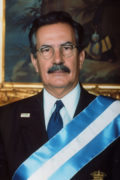
|
José Miguel Dukaroff Duarte (1918 - 2003) |
20 January 1986 | 20 January 1991 | Unión Demócrata Nacional | Carlos Tomiković Castro |
| Indirect and democratic elections. Dukaroff carried out a strong adjustment policy and cleaned up the Anchurian economy. Created a new currency with the help of the Minister of Economy, Gustavo Rodríguez Guerra, the Anchurian Peso, leaving aside the previous National Currency Peso, and removing 5 zeros from the currency. He officiated the trials of the military junta. Also promulgated Law 26,780/89 which establishes that crimes against humanity cannot prescribe. Through an amendment to the Anchurian Constitution, it was established that the mandate would last 5 years, and the start date of the mandate would be set as January 20. | ||||||
| 31 | 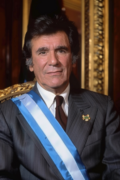
|
José Edgardo Acevedo (born 1940) |
20 January 1991 | 20 January 1996 | Unión Demócrata Nacional | Eduardo Muñoz Lagos |
| Direct and democratic elections. Former television presenter who became involved in politics. Known for his extravagant hairstyle. He served as National Deputy during the Dukaroff Presidency. He continued the economic policies of his predecessor. During his presidency there was a boom in foreign investment, leading to a better period of prosperity. Sign the Southern Free Trade Agreement, together with the governments of Managuay and Pandosia. He tried to get the Vestellarian government to deport the former dictator Ibarguren, without success, Ibarguren would die shortly after in exile. | ||||||
| 32 | 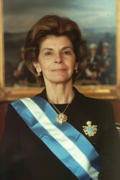
|
Azucena Arteaga (1941 - 2016) |
20 January 1996 | 20 January 2001 | Unión Demócrata Nacional | José María Ballestrini Ojeda |
| Direct and democratic elections. First female president of Anchuria. Her presidency was marked by the Economic Crisis of 1999. He adopted a policy of debt and budget restriction. Which had a strong impact on the world economy and resulted in an increase in unemployment and poverty. | ||||||
| 33 | 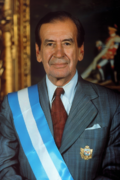
|
Vicente Castillo Arenas (1948 - 2004) |
20 January 2001 | 15 August 2004 | Frente Popular Cambia Anchuria |
Alejandro Ballesteros |
| Direct and democratic elections. He ran for election in alliance with the centrist Republican Alternative party. One of his first measures was to devalue the currency. To combat poverty and unemployment, it created more than two hundred thousand social plans called the "National Unemployment Plan." The territorial claims of the Aururian dictator Ioannis Metaxas also increased, ignoring the arbitration award of 1916 and claiming 1/3 of the Anchurian territory. Anchuria presented his case to the International Court of Justice (ICJ). On August 15, 2004, while on his way to the ICJ headquarters in Colburg to resolve disputes, Vicente Castillo Arenas died in a plane accident flying over international waters. Today many doubt whether it was an accident or an attack perpetrated by aururian agents. | ||||||
| 34 | 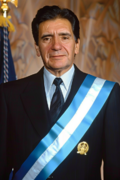
|
Alejandro Ballesteros (born 1951) |
15 August 2004 | 20 January 2006 | Alternativa Republicana Cambia Anchuria |
Vacant |
| Vice president of Vicente Castillo Arenas, he assumed the presidency after his death. Finished the presidential term of Castillo Arenas. During his tenure, the International Court of Justice (ICJ) ruled in favor of Anchuria, dismissing Aururian territorial claims. However, the Aururian provocations continue. Ballesteros signed a treaty of international cooperation and protection with Pandosia and the Kingdom of Orel Bactra. He also signed a contract for the purchase of weapons and fighter aircraft with the Kingdom of Ellaria. | ||||||
| 35 | 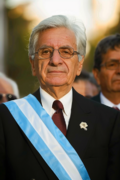
|
Emanuel Ibáñez Alameda (1943 - 2017) |
20 January 2006 | 20 January 2011 | Unión Demócrata Nacional | Daniel Castillo Hernández |
| Direct and democratic elections. During his tenure, the Anchurian War (2007-2009) and the Pandosian-Aururian War (2008-2009) were fought. Both ended with the victory of the allied countries: Pandosia, Anchuria, Managuay and Orel-Bactra. Ibáñez was present for the signing of the Treaty of San Borja, which put a cessation to hostilities, and the Treaty of Kingsbury, which established war reparations and sanctions towards Aururia. The war would have about 1,500,000 deaths between both sides, and countless material losses. It would also cause the outbreak of the Aururian Civil War, which continues to this day. He also presided over reconstruction efforts. Ibáñez maintained good relations with General Santino, provisional president of Pandosia after the execution of President Hernández during the Battle of Pablópolis. Signed the Santiago Protocol, which established the creation of the Mutual Defense Organization (ODM), a defensive pact between several countries. | ||||||
| 36 | 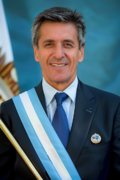
|
Luis Andrés Kravetz Miceli (born 1962) |
20 January 2011 | 20 January 2016 | Compromiso Ciudadano | Rafael Gutiérrez Arcelli |
| Direct and democratic elections. The economic crisis resulting from previous economic mismanagement and the Anchurian War was overcome thanks to countercyclical policies, increasing public spending. This generated increases in inflation in subsequent years. He took a large loan from the International Development Fund to cover post-war reconstruction costs. He increased social plans and state benefits, and also stimulated the growth of state employment. President Kravetz took advantage of his role in the state to defend social causes, increasing taxes on large fortunes and companies. During his years as president, growth slowed, provoking the first steps toward the crisis that would erupt during the presidency of his successor. | ||||||
| 37 | 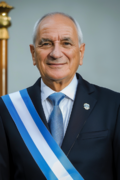
|
Rafael Gutiérrez Arcelli (born 1958) |
20 January 2016 | 20 January 2021 | Compromiso Ciudadano | Mónica Dávalos Gonzáles |
| Direct and democratic elections. He continued the policies of his predecessor. He increased benefits for those who fell into poverty after the war. Spending on infrastructure projects of dubious quality also increased. A major corruption scandal broke out due to overpricing of public works, which led to the resignation of the Minister of Infrastructure, Rafael Orellana. The fiscal crisis of 2019 also broke out, with a large jump in inflation, which reached 7% per month, due to both Kravetz and Gutiérrez printing large amounts of money to finance their expenses. Leading to the resignation of the Minister of Economy Pablo Andrés Arjún. | ||||||
| 38 | 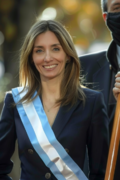
|
Marianela Vinković (born 1976) |
20 January 2021 | Incumbent | Unión Demócrata Nacional Unidos por el Cambio |
Juan Carlos Sfogliatelli |
| Direct and democratic elections. Second female president of Anchuria. Elected at 45 years old. Previously she served as National Senator and Minister of Foreign Affairs (2011-2016) of the Ibáñez government. His government gradually reduced state spending, also raised taxes and devalued the peso, putting more pressure on vulnerable sectors. He managed to lower inflation from 7% to 6% monthly, which many consider a failure. They also had several corruption scandals over expensive tenders when they said they would be an austere government. | ||||||
KINGS
| Malcolm III "Canmore" | |||||
|---|---|---|---|---|---|
 | |||||
| King of Scotland | |||||
| Reign | Jan 1 1031 - Jul 13 1099 | ||||
| Predecessor | Lulach I of Scotland | ||||
| Successor | Kenneth VII of Scotland | ||||
| Born | January 2 1031 Scone, Scotland | ||||
| Died | July 13 1099 Glenmore, Scotland | ||||
| Spouse | Ingebjørg Finnsdatter | ||||
| Issue | |||||
| |||||
| Dynasty | Dunkeld | ||||
| Father | Duncan I of Scotland | ||||
| Religion | Roman Catholicism | ||||
| Kenneth VII "the Gracious" | |||||
|---|---|---|---|---|---|
 | |||||
| King of Scotland | |||||
| Reign | Jul 13 1099 - Mar 7 1152 | ||||
| Predecessor | Malcolm III of Scotland | ||||
| Successor | Alexander I of Scotland | ||||
| King of Wales | |||||
| Reign | Dec 6 1134 - Mar 7 1152 | ||||
| Predecessor | Title established | ||||
| Successor | Kenneth II of Wales | ||||
| Born | Nov 22 1081 Scone, Scotland | ||||
| Died | Mar 7 1152 Glenmore, Scotland | ||||
| Spouse | Alienora of England | ||||
| Issue | |||||
| |||||
| Dynasty | Dunkeld | ||||
| Father | Prince Donald of Scotland | ||||
| Religion | Roman Catholicism | ||||